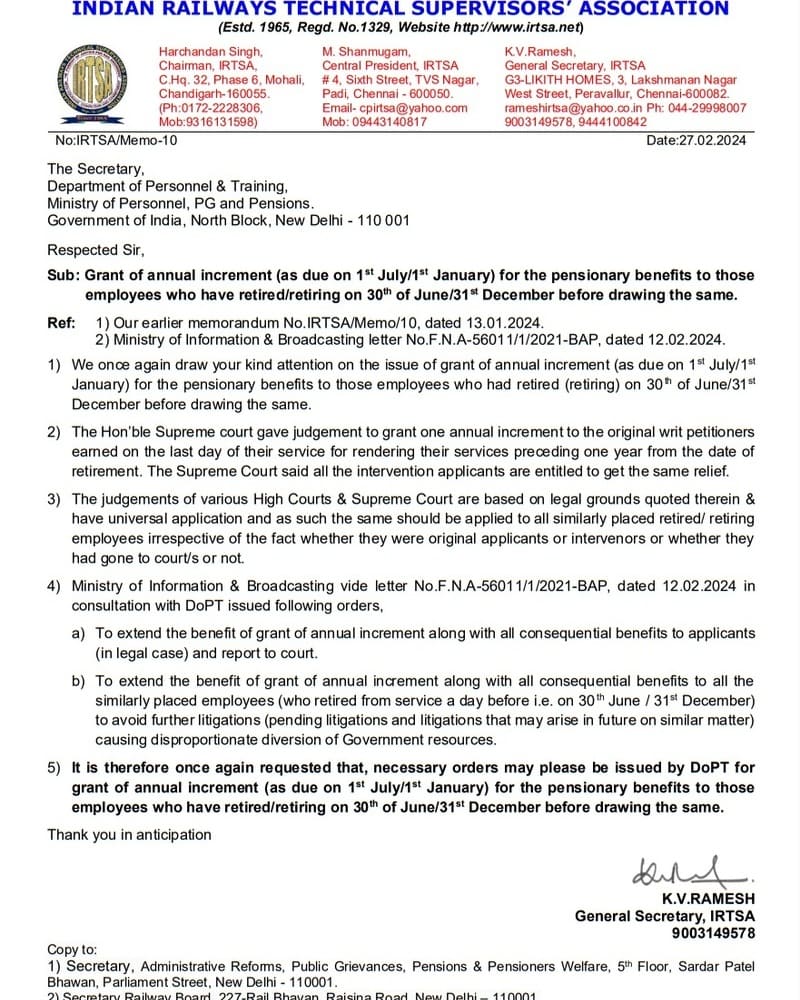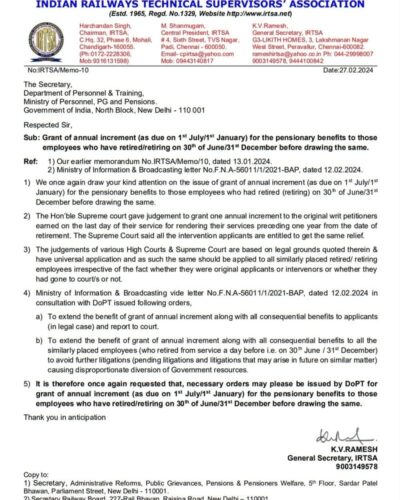Grant of annual increment (as due on 1st July/1st January) for the pensionary benefits to those employees who have retired/retiring on 30th of June/31st December before drawing the same: : Reminder Memo to DoP&T
INDIAN RAILWAYS TECHNICAL SUPERVISORS’ ASSOCIATION
No:IRTSA/Memo-10
Date:27.02.2024
The Secretary,
Department of Personnel & Training,
Ministry of Personnel, PG and Pensions.
Government of India, North Block, New Delhi – 110 001
Respected Sir,
Sub: Grant of annual increment (as due on 1st July/1st January) for the pensionary benefits to those employees who have retired/retiring on 30th of June/31st December before drawing the same.
Ref: 1) Our earlier memorandum No.IRTSA/Memo/10, dated 13.01.2024.
2) Ministry of Information & Broadcasting letter No.F.N.A-56011/1/2021-BAP, dated 12.02.2024.
1) We once again draw your kind attention on the issue of grant of annual increment (as due on 1st July/1st January) for the pensionary benefits to those employees who had retired (retiring) on 30th of June/31st December before drawing the same.
2) The Hon’ble Supreme court gave judgement to grant one annual increment to the original writ petitioners earned on the last day of their service for rendering their services preceding one year from the date of retirement. The Supreme Court said all the intervention applicants are entitled to get the same relief.
3) The judgements of various High Courts & Supreme Court are based on legal grounds quoted therein & have universal application and as such the same should be applied to all similarly placed retired/ retiring employees irrespective of the fact whether they were original applicants or intervenors or whether they had gone to court/s or not.
4) Ministry of Information & Broadcasting vide letter No.F.N.A-56011/1/2021-BAP, dated 12.02.2024 in consultation with DoPT issued following orders,
a) To extend the benefit of grant of annual increment along with all consequential benefits to applicants (in legal case) and report to court.
b) To extend the benefit of grant of annual increment along with all consequential benefits to all the similarly placed employees (who retired from service a day before i.e. on 30th June / 31st December) to avoid further litigations (pending litigations and litigations that may arise in future on similar matter) causing disproportionate diversion of Government resources.
5) It is therefore once again requested that, necessary orders may please be issued by DoPT for grant of annual increment (as due on 1st July/1st January) for the pensionary benefits to those employees who have retired/retiring on 30th of June/31st December before drawing the same.
Thank you in anticipation
K.V.RAMESH
General Secretary, IRTSA
9003149578
Copy to:
1) Secretary, Administrative Reforms, Public Grievances, Pensions & Pensioners Welfare, 5th Floor, Sardar Patel Bhawan, Parliament Street, New Delhi – 110001.
2) Secretary Railway Board, 227-Rail Bhavan, Raisina Road, New Delhi – 110001.
View/Download the PDF


COMMENTS
Central govt has adopted a partisan approach as far as issuance of notional increment is concerned by drawing a line on the date in 2023.The litigants have been seeking justice since 2011and most of them have got the said increment through court orders.The dopt order on notional increment making it applicable from 2023 is unjustified and violation of constitutional provisions. The order instead should take effect from the date on which Madras high court decided the case otherwise it is clear violation of article 14 of Constitution. Central govt should review the order and allow the notional increment to all those who deserve it and no line should be drawn atleast not after the first judgement of Madras high court.